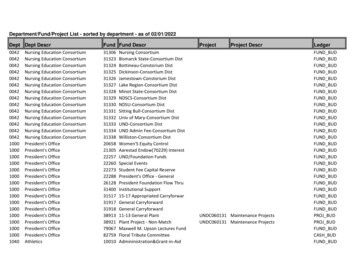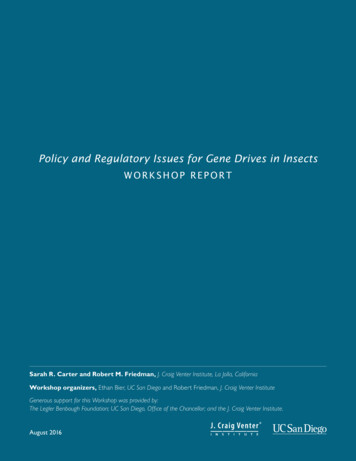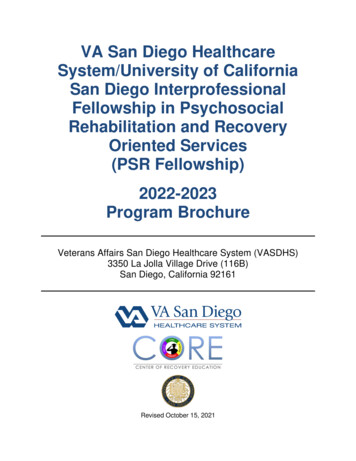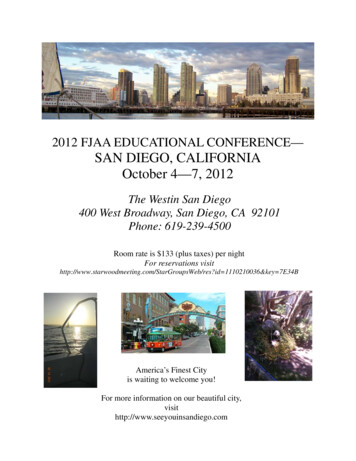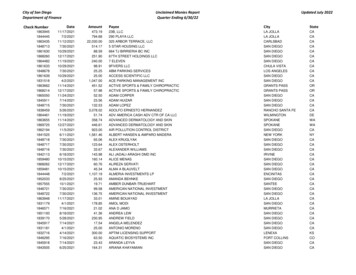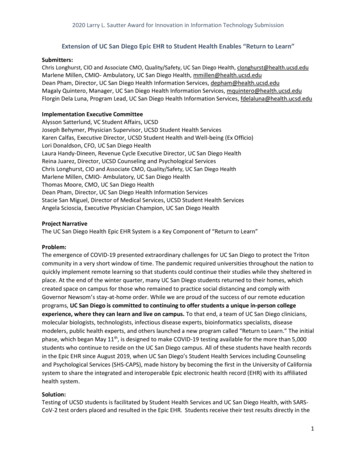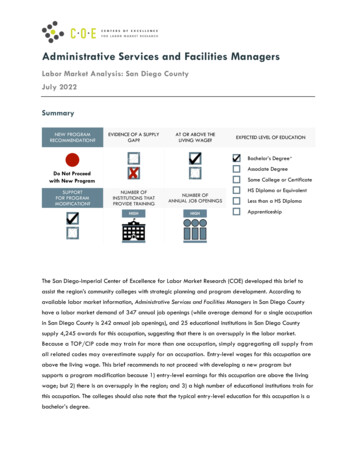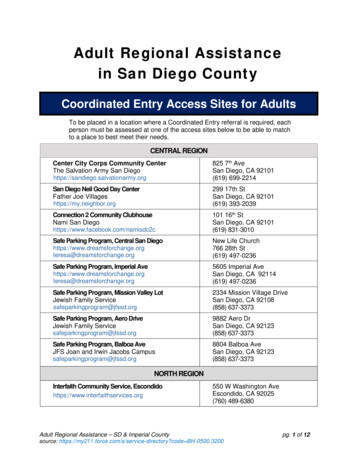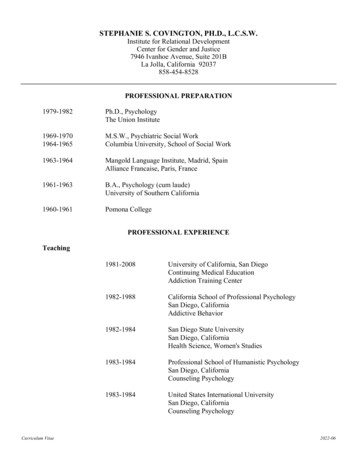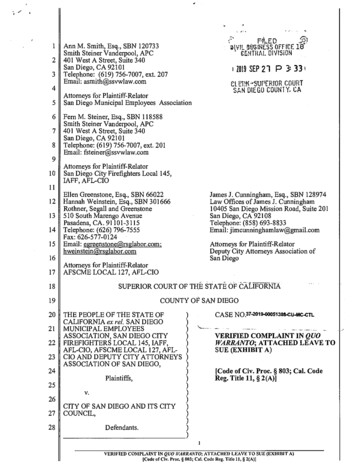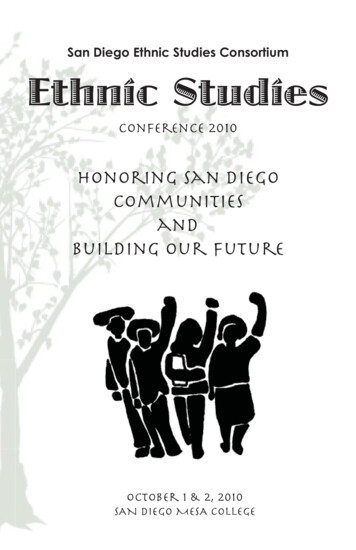
Transcription
San Diego Ethnic Studies ConsortiumEthnic StudiesConference 2010Honoring San DiegoCommunitiesandBuilding Our FutureOctober 1 & 2, 2010sAN DIEGO MESA COLLEGE
San Diego CountyEthnic Studies ConsortiumCalifornia State University, San MarcosPalomar CollegeSan Diego City CollegeSan Diego Mesa CollegeSan Diego State UniversityUniversity of California, San DiegoUniversity of San Diego
Mission StatementThe San Diego County Ethnic StudiesConsortium is a collaborative of faculty, staff,students, and community memberscommitted to the study of race, ethnicity, andsocial justice.We represent autonomous academicdisciplines and intellectual traditions, includingAmerican Indian Studies, Asian AmericanStudies, Black/African American/AfricanaStudies, Chican@/Latin@ Studies,and Ethnic Studies.Viewing ourselves as distinct andinterconnected, we are dedicated to thepromotion and advancement of our disciplinesthrough scholarship, teaching, institutional andcommunity engagement, advocacy,and collaboration.
OPEN LETTER TO THE SAN DIEGO COMMUNITYThe recent passage of House Bill (HB) 2281 in Arizona, a law that essentially bans Ethnic Studies in K-12 public schools, has generated deep concernamong educators, students and staff in our county. This bill caricaturesthe more than 700 such programs in the nation; along with Senate Bill (SB)1070, it sends the message that people of color, indigenous people andimmigrants are not welcome in this country and that their histories andcultures should be excluded from public education. While this bill was expressly written to target the Mexican American Studies program in the Tucson Unified School District (and the 3% of the 55,000 students in the districtwho take such courses), its language implicates programs like AmericanIndian Studies and African American Studies as well. Both SB 1070 and HB2281 draw upon a long history of the persecution of immigrants and therepression of cultures, from the banning of German bilingual schools in the1920’s to the outlawing of American Indian religious and cultural expression. In other words, courses in Ethnic Studies (i.e. pertaining to AmericanIndians, African Americans, Asian Americans, and Chicana/os) demonstrate how such laws are historically reproduced over and over, oftenduring times of economic recession and crisis. And perhaps that is why thisbody of knowledge seems to be so threatening. While we are saddenedto see such hoary tactics resurrected, we have also been moved to organize, reflect upon our own programs in the county, and argue for an evengreater need for such courses in the future.HB 2281 claims that Ethnic Studies courses advocate the “overthrow of theUnited States government,” promote “resentment,” and cater to pupils ofa certain ethnic group. The charge that Ethnic Studies promotes separatism and antagonism to the U.S. is made without proof. SuperintendentTom Horne decided to meet with Tucson teachers a day after the bill wassigned into law. This disregard for the facts was evident in the hearings forthe bill when many defenders, including the ACLU, were not allowed topresent their arguments. Belatedly, Horne is now proposing to videotapeTucson classes under the guise of collecting evidence but with an obviousintent to intimidate—and further violate academic freedom and students’learning environments. In fact, Mexican American Studies courses werecreated in 1998 partly to alleviate the damages of de facto segregationin Tucson schools. With a 97% graduation rate (as opposed to the average44% rate) and with 67% of students going on to post-secondary education, these courses have been successful in mainstreaming students, andnot in separating them as detractors claim. In addition, Ethnic Studiescourses have always promoted understanding and not “resentment.” Students report that some classes begin with a discussion of In Lak’ Ech, theMayan phrase for “You are my other self.” Student Pricila Rodriguez notesthat the courses are founded on “love and diversity,” but discuss” racismand sexism.” This formula for truth telling with a compassionate intention isa lesson Arizona lawmakers could use. Equally disturbing is that the Arizonalegislature has used its power to attack a program that works, yet is
not addressing longstanding problems such as grouping students by abilityand language that may result in disparate impact by ethnicity.For all of us in the county who teach or take these classes, a law banninghistory and fact is chilling indeed. Not only are certain human beings nowillegal, but so are simple matters of fact, let alone opinion. Would the studyof Jim Crow laws or Japanese Internment provoke “resentment”? Suchsilencing strategies would continue the incomplete historical narrativesthat Ethnic Studies proposes to remedy. The goal has always been moreinformation and hence a more inclusive notion of American experiencesand identities. Further, we would argue that the erasure of the study ofmasses of people in the U.S. has damaged all Americans, at its extreme inthe identity formation of white supremacy and its attendant violence andexploitation. Ethnic Studies works to create a more inclusive society bydeepening our understanding of each other and by producing engagedcitizens.One unintended outcome of these events is that we, like the students andteachers in Tucson, have been re-energized to act. While we formed the“SDESC” (The San Diego Ethnic Studies Consortium) in response to HB 2281and demand that this law should be repealed, we have come to understand that we have work to do in our own county. San Diego itself is nowa “majority minority” county with a Metro area that is 22% foreign-bornand 42% second-generation. Reflected in the SDESC are some of the oldest programs in the nation. Chicano Studies was founded at SDSU in 1970,Black Studies at San Diego Mesa College in 1970, and Ethnic Studies atUCSD in 1980, one of the few PhD programs in the nation. As well, EthnicStudies programs exist at San Diego Community College, CSU, and privateuniversity levels. We can boast vibrant African American, American Indian,Asian American, Chican@/Latin@, and many other communities. Often,it was these very communities that came out to support the creation ofEthnic Studies programs. Yet we have almost no K-12 programs, given ourdemographics and given the possibility that such courses could improvethe achievement of our students. The events in Arizona have given us theopportunity here to renew our commitments to K-12, post-secondary, andgraduate programs. While forty years of Ethnic Studies has given us a “different mirror” that begins to reflect the multiplicities of our national experience, Arizona demonstrates that these gains are never uncontested norfinal. We need to bring all of our people and all of our history out of theshadows. In doing so, we have the chance to re-imagine a very differentkind of world.San Diego Ethnic Studies Consortium
PresentersSean Arce is the current Director of Mexican-American Studies at TucsonUnified School District. He participated in the run for equality and justicelast summer.Elizabeth Armstrong’s career includes over 35 years of service in highereducation. Prior to coming to Mesa College, Liz served at Cañada College as Vice President of Instruction (1999-2002) and Dean of Science,Technology and Learning Resources(1989-1999). In 2006, she receivedthe Award for Administrative Excellence from the Association of CaliforniaCommunity College Administrators (ACCCA).Elisa Barnett is a Mesa College student focusing on Chicana/o and LatinAmerican Studies. She has a BA from Kenyon College and works for TheMeeting Place Clubhouse as a Social Security advocate for adults withmental illness.Long Bui is a UC President’s Dissertation Fellow in the Department of EthnicStudies at UCSD. He is currently completing his dissertation that interrogates the discourse of Asian globalization, and the idea that rapidly industrializing countries in Asia present the “global future,” through the figure ofthe Asian female subaltern.Justin Akers Chacón is an Associate Professor of Chicana/o Studies atSan Diego City College. He is co-author (with Mike Davis) of No One isIllegal: Fighting Racism and State Violence, and a contributing author tothe recently published Walls, Fences, Borders, and Boundaries: Essays onSocial Exclusion, Inclusion and Integration (Kendall Hunt, 2010). He alsoparticipates with human rights and immigrant rights organizations in theSan Diego-Tijuana border region.Patricia Dixon (Luiseño) has been a Professor in the American Indian Studies Program at Palomar College since 1971. She has continued graduatestudies in Comparative Religion and American Indian Law and Government. She is also a lecturer and consultant on the American Frontier andIndian History for local schools and colleges. Ms. Dixon is a respectededucator and leader in San Diego County.Sharon Elise is a Professor of Sociology at CSU San Marcos (since 1994).She has areas of expertise in Critical Race Studies, Sociopoetics, BlackFeminism, Race & Representation, Black issues in Higher Education. She isactive in the California Faculty Association as member of the state-wideCouncil for Affirmative Action.Sherehe Hollins is a professor of Black Studies, educational consultant,and visual and performing artist. She is the author of an award-winningpoetry book Heart Love Messages of the Soul, and is the creator of HeartLove Publications, which publishes multicultural and multilingual children’sliterature.
PresentersStarla Lewis is a Professor of Black Studies at San Diego Mesa College andseven-time recipient of the Teacher of the Year Award, has 36 years of research and experience in Ethnic Studies, Women Studies and African Studies. She is the author of Sunkisses, a multilingual and multicultural children’sbook.Rashné Limki is a Ph. D. candidate in the Department of Ethnic Studiesat UCSD. She is an active member of the UCSD Coalition for EducationJustice as well as the October 7th Day of Action Planning Committee inSan Diego.Jorge Mariscal is a Professor of Literature at UC San Diego and Director ofthe Chicana/o Latina/o Arts & Humanities Minor Program. He has writtenwidely on the Chicano Movement of the Viet Nam War period and on theSpanish origins of Western racism. He has been active in Project YANO,an anti-militarism organization in San Diego that provides youth with factsabout military service.Joely Proudfit is a descendant of the Pechanga Band of Luiseño MissionIndians. She is Director of the California Indian Culture and SovereigntyCenter, Program Director of Native Studies, and is an Associate Professorof Sociology at CSU San Marcos. She was the first special advisor to theHonorable Cruz M. Bustamante, Lieutenant Governor of California, forCalifornia Indian Sovereign Nations in 2002.Augustine Romero is Director of Student Equity (and former director ofMexican-American Studies) at Tucson Unified School District. His K-12 programs in Ethnic Studies have been the main target of AZ HB 2281 banningEthnic Studies, as well as last year’s bill which was defeated when community members ran 120 miles across the Arizona desert from Tucson toPhoenix. He was one of the runners. He has organized the Tucson Institutefor Transformative Education for the past 15 years.Shirley Weber is a full Professor and Chair of the Department of AfricanaStudies at SDSU. She is Director of the Academy for Effectively TeachingAfrican American Students, a collaboration between local educators andthe university. Dr. Weber is also the co-founder and Director of the W.E.B.DuBois Leadership Institute for Young Black Scholars through the NAACP,and co-Director of a Summer Institute in Ghana at the University of Lagon.K. Wayne Yang is an Assistant Professor of Ethnic Studies at UC San Diego.He was a public school teacher for over 15 years in Oakland, CA, wherehe also co-founded East Oakland Community High School, and theAvenues Project, a youth development non-profit organization. He is currently writing a book, Organizing the Common Sense: Popular Culture andUrban School Reform, which examines strategies for organizing in education across three landscapes: youth, community, and bureaucracy.
ScheduleFRIDAY, OCTOBER 14:00 – 5:00 PMRegistration, G-Building5:00 – 6:30 PMOpening ReceptionDrum Call, Teye Sa Thiossane6:30 – 8:00 PMWelcome, Starla Lewis, MesaOpening Plenary (G-101/102)Featuring:Patricia Dixon, Palomar College; Sharon Elise, CSUSM;Jorge Mariscal, UCSD; K. Wayne Yang, UCSD; Elisa Barnett, Mesa CollegeFacilitated by Shirley Weber, SDSU8:00 – 9:00 PMPerformances (G-101/102)Featuring:Ishé, Sherehe Roze, Teatro Izcalli, & Kaleo O’NalaniEmceed by César López, MesaSATURDAY, OCTOBER 28:00 – 10:30 AMRegistration8:30 – 8:45 AMPrayer, Falling Rock Drum GroupHenry Mendibles (Apache), Kim Flying Eagle (Dine),and Frank Eagle Plume Gastelum (Yaqui and Navaho)9:00 – 9:10 AMWelcome, Elizabeth J. Armstrong, Interim President, Mesa (G-101/102)Opening Remarks, May Fu, USD9:10 – 10:00 AMIntroduction, Gail Perez, USDKeynote Presentation:Augustine Romero, Director of Student EquitySean Arce, Director of Mexican-American StudiesTucson Unified School District
10:00 – 10:30 AMPress Conference10:30 – 12:00 PMTeach-in (G-101/102)Featuring:Starla Lewis, Mesa CollegeRashné Limki & Long Bui, UCSDJustin Akers Chacón, City CollegeJoely Proudfit, CSUSM12:00 – 1:15 PMLunch1:30 – 3:00 PMWorkshop Session IA.B.C.D.E.F.State of SD Ethnic Studies: Report from Our Campuses (G105)Injecting Race into the Discourse: Critical Race Theory (G104)Chican@ Literature in San Diego Unified School District (G106)The Role of Culture in K-12 Education: Pacific American Academy& All Tribes American Indian Charter School (G107)SDESC Student Caucus (G101)Teach-in Discussion Group (G102)3.15 – 4.45 PMWorkshop Session IIA.B.C.D.E.F.Knowledge is Power: Keys to Surviving Administrative Challenges &Developing Administrative Success (G104)Race and the Uneven Pipeline to Graduate School: A Workshopwith UCSD’s ES Graduate Students (G105)African American Music as Social Commentary (G101)Ethnic Studies as Educational Justice: Building an OrganizationalCoalition for Oct 7 The Importance of Activism(G107)Writing as a Revolutionary Act: Chicana Publishing for the NewMillennium (G106)Teach-in Discussion Group (G102)5.00 – 5.30 PMClosing (G-101/102)Featuring:UCSD Art Collective
Workshop Session IA. The State of San Diego Ethnic Studies: Report from Our CampusesPresenters: Enrique Davalos – Chican@ Studies, City College; Yolanda Escamilla – Ethnic Studies, UCSD; Shirley Flor – Asian American Studies, MesaCollege; Michelle Holling – Communications & Ethnic Studies, CSUSM; Victoria González Rivera, Chican@ Studies, SDSU; Tchaiko Kwayana – BlackStudies, Mesa; Gail Perez – Ethnic Studies, USD; John Valdez – MulticulturalStudies, Palomar College; César López - Chican@ Studies, Mesa CollegeEthnic Studies faculty and staff will report on the current climate andstatus of Ethnic Studies and related departments and programs on ourcampuses. They will discuss the strengths and challenges of their workand dialogue about possibilities for growth, stability, and collaboration.B. Injecting Race into the Discourse: Critical Race TheoryPresenter: Manuel Velez – Chican@ Studies, Mesa CollegeIn today’s society the discussion of racism has become just as tabooas racism itself. This workshop will focus on the impact that the absence of a dialogue on racism has had upon our society and howthat dialogue can be introduced in an academic setting. A focus onCritical Race Theory will be placed.C. Chican@ Literature in San Diego Unified School DistrictPresenters: Macedonio Arteaga – Student Advocate for the Departmentof Race and Human Relations, San Diego Unified School District; Joe Lara– Assistant Principal, Olympian High School, Sweetwater Union High SchoolDistrictIn August 2010, the Board of Education of San Diego Unified SchoolDistrict (SDUSD) approved a pilot Chican@ Literature (CCL) courseto be offered in three small high school academies for the 2010-2011school year. The approval of CCL in SDUSD is a historical event thatprovides opportunities for all students to learn about their uniqueethnic heritage. Ethnic literacy allows all students to understand theiruniqueness, to understand the complexities of ethnicity and culture, and to take pride in who they are as people as well as learn torespect other cultural groups. Students will become culturally empowered individuals by engaging in problem-solving activities andlearning about the importance of being an active participant in ademocractic society. The Chican@ Literature course seeks to enhance understanding of the Mexican and Mexican American experience, as well as the broader Latino experience. Current issues withinthe Mexican American community are also investigated, includingimmigration, racism, equity, and other aspects of Mexican Americanand Latino populations.
D. The Role of Culture in K-12 Education: Pacific American Academyand All Tribes American Indian Charter SchoolPresenters: Mary Ann Donahue – Principal, All Tribes American IndianCharter School; Michelle Parada (Luiseño) – Language and ScienceTeacher, Athletic Director, All Tribes American Charter School; Brett Snyder– 2nd Grade Teacher, Pa’a Pacific American AcademyPa’a, Pacific American Academy Charter School (City Heights, SanDiego) and All Tribes American Indian Charter School (Rincon Reservation) are two grassroots charter schools dedicated to indigenous education as a means to student success. It is the belief of both schools,that a caring environment, cultural enrichment, and reinforcement ofa positive self-image are paramount to student success within schooland society. As a quick lead into the topic of culturally-based charterschools a very short discussion will be given reflecting on the evolutionof Hawaiian Studies and American Indian Studies within the contextof decolonization and sovereignty. This workshop will take the form ofa panel discussion. Its intended audience will be educators, students,community leaders, and all those willing to participate in a constructive discussion. The panel discussion will feature teachers, principals,and students who will speak primarily on the meaning, aspirations,program, and challenges they face within their schools.E. SDESC Student CaucusFacilitator: Elisa Barnett - Mesa CollegeWith the establishment of the San Diego Ethnic Studies Consortium, anew step forward is being taken in regard to the growth and development of Ethnic Studies throughout the San Diego area. Our diverseidentities drive us to create an organization that is both inclusive andrespectful of the various groups that form the Consortium. It is also fundamental to recognize that some of the most vital components of theConsortium are the students. Students have played an important rolein the creation of vibrant Ethnic Studies departments nationwide, andthe student component of the SDESC is no less essential. The inclusionof students in the Consortium will help to continue a growth of vitality and ingenuity. The SDESC Student Caucus will be an opportunityfor the student body of San Diego’s institutions of higher learning toparticipate in the discussion of their role in the SDESC and the mannerin which they feel that student participation should take place. Thegoals of the caucus include establishing a framework for student participation and identifying areas of interest for Ethnic Studies studentfaculty collaborationat all levels of higher education.
Workshop Session IIA. Knowledge is Power: Keys to Surviving Administrative Challenges &Developing Administrative SuccessPresenters: Thekima Mayasa – Black Studies, Mesa College; Shirley Weber– Africana Studies, SDSUWhat does it mean to be a representative or chair of an Ethnic Studies discipline, department, program, or course? Where does one getthe administrative training needed to run a successful program? Howare contractual and administrative responsibilities met and balancedeffectively? These and other critical administrative issues must be afocus of discussion as we in the examination of 21st century administrative challenges, consequences and recommendations for movingfrom a status of surviving to thriving. This workshop takes a definitivelook at the administrative challenges faced by Ethnic Studies departments, programs, courses and student groups amidst their efforts tobuild, survive, and thrive within the campus and communities theyserve. Participants will interactively explore the latest trends and newforms of administrative challenges while sharing strategies that supportour common and unique needs.B. Race and the Uneven Pipeline to Graduate School: A Workshop withUC San Diego’s Ethnic Studies Graduate StudentsPresenters: Martha Escobar; Angela Kong; Candice Rice; Stevie Ruiz;Angelica YanezEthnic Studies graduate programs attract a diverse group of studentswho have a commitment to seek what is politically at stake in theresearch we choose to study. Often, students who apply to EthnicStudies programs are themselves people of color, indigenous, firstgeneration college students, children of immigrants, refugees, queeror working class. As public universities market themselves as equitablyaccessible to disenfranchised communities of color, we have earmarked a growing concern that we cannot afford to teach or workwith less people of color at the university. Budget cuts, shortage ofstaff, and efforts to legislate academic freedom in Arizona are signsthat Ethnic Studies programs at the under/graduate levels requirea refashioning of how to respond to a society that is allegedly postracist. For these reasons, we, the graduate students in the Departmentof Ethnic Studies at UC San Diego, will use this workshop to tackle arange of issues including admissions, the politics of knowledge production, the limits of multicultural representation on campus, academicfreedom, teaching, mentoring, collegiality, balancing family withwork, and building community. Drawing from student experiences, weintend to facilitate a larger dialogue about what it means intellectually, personally and politically to earn a Ph.D. in Ethnic Studies.
C. African American Music as Social CommentaryPresenter: Delores Fisher – Africana Studies, SDSUThis workshop will provide a brief overview of African American musicas a socio-cultural lived-experience communication tool. This toolcreated space for social resistance and disruption within the majorityculture’s designated “societal norm” that provided and embracedalternative ways of being. Identification and isolation of select AfricanAmerican cultural aesthetics threads embedded in lyrics, music making, corporeal presence, and performance practices during specifichistorical eras from the 1800s through the twenty-first century will belinked to one musician in each select era. A media comparison ofthese performers and their music will provide “alternative” texts toillustrate these musical threads used to weave a socio-cultural commentary that reflects the fabric of African American lived-experiencein America. The presentation will be followed by audiencediscussion and comments.D. Ethnic Studies as Educational Activism and Justice: Building anOrganizational Coalition for Oct. 7Presenters: Members of MEChA de Mesa; Long Bui and Rashné Limki –Ethnic Studies Graduate Students, UCSD; Joseph Ramirez – UCSD CrossCultural CenterThis collaborative workshop, facilitated by activists and scholars, willdiscuss the politics and strategies involved in organizing around issuesof restoring public education and public services. Beginning witha short history of activism – the civil rights movement, the Chicanomovement, the farm workers’ movement – this workshop will thenaddress Oct. 7, the next national day action to defend public education and public services. Thus, we seek to bring activists and studentsto speak on and organize around issues including but not limited toeducation, including SB 1070 and immigration reform, and the DREAMAct.E. Writing as a Revolutionary Act: Chicana Publishing for the NewMilleniumPresenters: Rita Sanchez, Adelaida Del Castillo, Consuelo Manriquez,Felicitas NuñezThis workshop will focus on the writing and publishing of Latina voicesas a means of of strengthening and preserving the Latina experience.Workshop participants will discuss ways to encourage Latinas to writeabout their experiences and offer advice on how to get their workpublished.
Campus ResourcesCalifornia State University San MarcosEthnic Studies (Minor)Web: http://www.csusm.edu/ethnicstudiesE-mail: mholling@csusm.eduTel: (760) 750-8576Native Studies (Minor)Web: http://www.csusm.edu/nsWeb: jproudfit@csusm.eduTel: (760) 744-4619City CollegeBlack StudiesWeb: : dwatson@sdccd.eduTel: (619) 388-3795Chicano StudiesWeb: l: tmacrena@sdccd.eduTel: (619) 388-3585Mesa CollegeBlack StudiesWeb: http://www.sdmesa.edu/black-studies/E-mail: tmayasa@sdccd.eduTel: 619-388-2352Chicano StudiesWeb: http://www.sdmesa.edu/chicano-studies/E-mail: mornelas@sdccd.eduTel: 619-388-2266Miramar CollegeBlack StudiesE-mail: mmcphers@sdccd.eduTel: 619-388-7516Filipino StudiesE-mail: jpatacsi@sdccd.eduTel: 619-388-7564
Palomar CollegeMulticultural StudiesWeb: lE-mail: dsilva@palomar.eduTel: (760) 744-1150, ext. 2206San Diego State UniversityAfricana StudiesWeb: http://www-rohan.sdsu.edu/ afras/Email: africana@mail.sdsu.eduTel: (619) 594-6531American Indian StudiesWeb: http://www-rohan.sdsu.edu/ aminweb/Email: mfield@mail.sdsu.eduTel: (619) 594-6991Chicana and Chicano StudiesWeb: http://aztlan.sdsu.edu/Email: ccs@mail.sdsu.eduTel: (619) 594-6452University of California San DiegoAfrican American Studies (Minor)Web: http://af-amstudies.ucsd.edu/Email: af-amstudies@ucsd.eduTel: (858) 534-4110Chicano/a and Latino/a Arts and Humanities (Minor)Web: http://minors.ucsd.edu/clah/clah portal/E-mail: mmnaranjo@ucsd.eduTel: (858) 822-4059Ethnic StudiesWeb: http://ethnicstudies.ucsd.edu/E-mail: yescamilla@ucsd.edu (undergrad)taitchison@ucsd.edu (grad)Tel: (858) 534 3276University of San DiegoEthnic StudiesWeb: http://www.sandiego.edu/cas/es/E-mail: ethnicstudies@sandiego.eduTel: (619) 260-4022
SponsorsCSUSMEthnic Studies ProgramCollege of Arts and SciencesMesa CollegeAssociate Student GovernmentBlack Student UnionBlack Studies DepartmentChicana/o Studies DepartmentImmigration Student Support OrganizationMEChAMuslim Student UnionSue Shrader-Hanes, Clinical Coordinator: Student Health ServicesSuzanne Khambata, Director: Student Health ServicesOffice of the PresidentSDSUDepartment of Africana StudiesDepartment of American Indian StudiesDepartment of Chicana and Chicano StudiesOffice of Dr. Paul Wong, Dean, College of Arts and LettersOffice of Intercultural RelationsUCSDCenter for Global California StudiesChicano/a and Latino/a Arts & HumanitiesDepartment of Ethnic StudiesUSDCenter for Community Service-LearningCenter for Inclusion and DiversityDepartment of Ethnic Studies
Black Studies at San Diego Mesa College in 1970, and Ethnic Studies at UCSD in 1980, one of the few PhD programs in the nation. As well, Ethnic Studies programs exist at San Diego Community College, CSU, and private university levels. We can boast vibrant African American, American Indian, Asian American, Chican@/Latin@, and many other communities.
